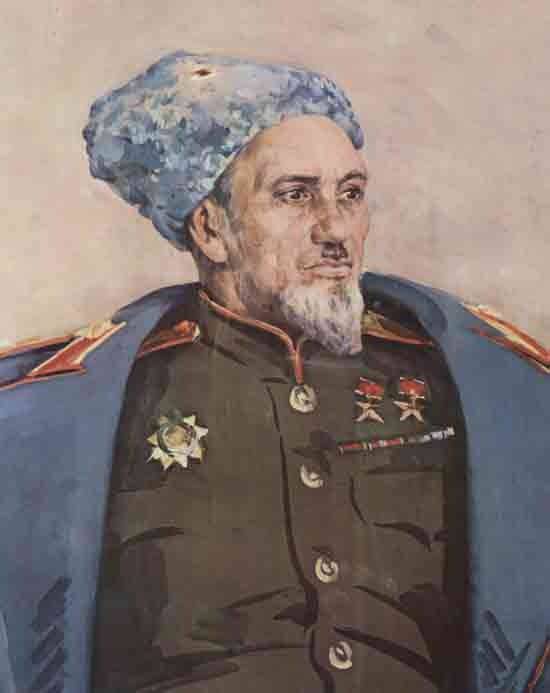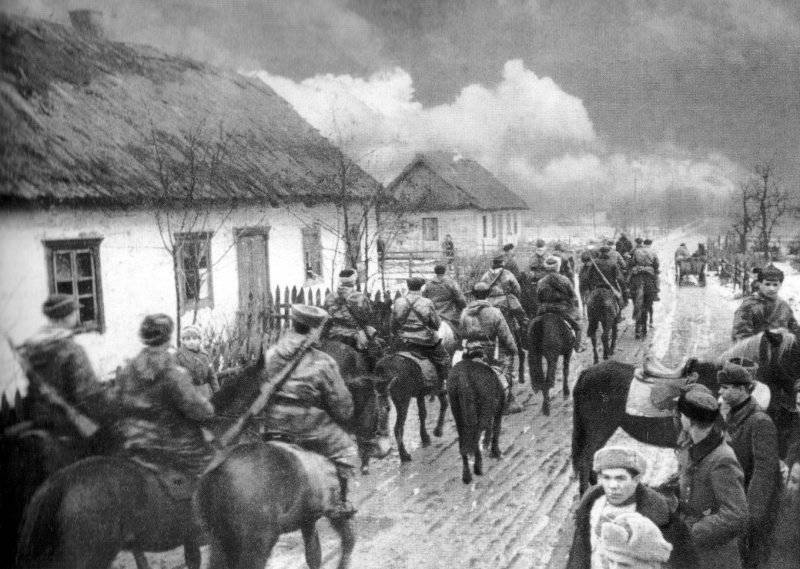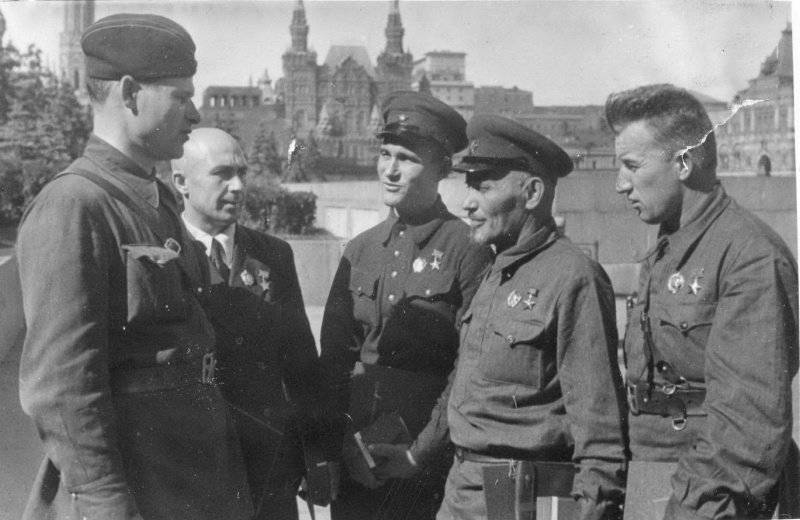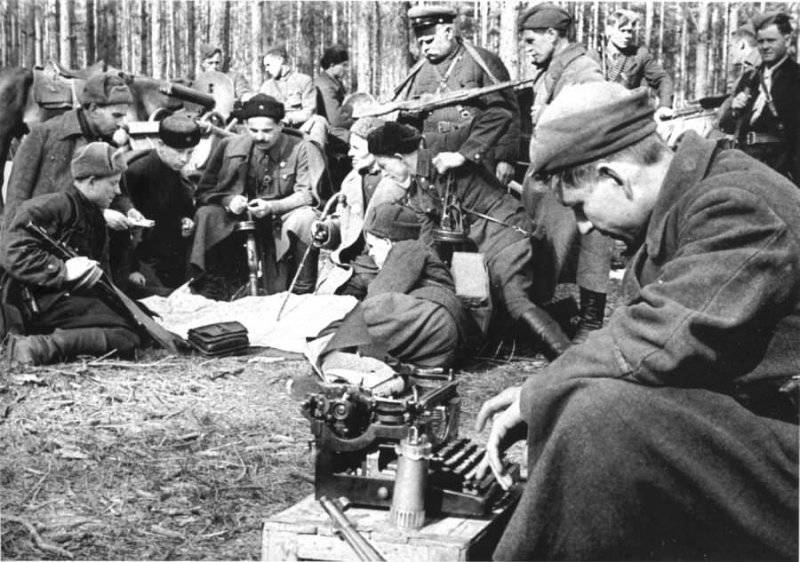Partisan General Sidor Artemyevich Kovpak
When World War I began, Kovpak was mobilized into the army. In the 1916 year, fighting as part of the 186 Infantry Regiment of the Aslanduz Regiment, he took part in the famous Brusilov Breakthrough. Sidor Artyomovich was a scout, already standing out among the rest with his sharpness and ability to find a way out of any situation. He was wounded several times. In the spring of 1916, Tsar Nicholas II, who personally came to the front, among other things, awarded the young Kovpak with two medals "For Bravery" and St. George's Crosses of III and IV degrees.

After the start of the revolution, Kovpak chose the side of the Bolsheviks. When, in the 1917 year, the Aslanduz regiment went into reserve, ignoring Kerensky's order to attack, Sidor, among other soldiers, returned home to his native Kotelva. The civil war forced him to raise a rebellion against the regime of Hetman Skoropadsky. Hiding in the woods, Sidor Artemovich learned the basics of partisan military art. The Kotelva unit headed by Kovpak bravely fought with the German-Austrian invaders of Ukraine, and later, united with the fighters of Aleksandr Parkhomenko, with Denikinians. In the 1919 year, when his squad fought Ukraine’s war-ridden Ukraine, Kovpak decides to join the Red Army. In the 25-th Chapayev Division, in the role of platoon commander of machine-gunners, he fought first on the Eastern Front, and then on the Southern with General Wrangel. For his courage, he was awarded the Order of the Fighting Red Banner.
After the end of the Civil War, Kovpak decides to engage in economic work. Also, becoming a member of the RKP (b) in 1919, he worked as a military commissar. In 1926, he was elected director of the military-cooperative economy in Pavlograd, and then chairman of the Putivl agricultural cooperative, which supplied provisions to the army. After the approval of the USSR Constitution of 1936, Sidor Artemovich was elected deputy of the City Council of Putivl, and at its first meeting in 1937 of the year - chairman of the city executive committee of the Sumy region. In a peaceful life, he was distinguished by exceptional diligence and initiative. In the thirties, many former "red" Ukrainian partisans were arrested by the NKVD. Only in Poltava region several thousand people were shot. Only thanks to the old comrades who occupied prominent places in the NKVD, Kovpak escaped from inevitable death.
In the early autumn of 1941, the German fascist invaders approached Putivl. Kovpak, who was already 55 old at the time, toothless and suffering from old wounds, hides together with nine friends in the nearby Spadshchansky forest area with 10 size 15 kilometers. There the group finds a food warehouse, which Kovpak prepared ahead of time. In late September, they were joined by the Red Army men, surrounded by soldiers, and in October, a detachment led by Semyon Rudnev, who became Kovpak’s closest friend and ally during the Great Patriotic War. Squad increases to 57 people. Weapons a little, even less ammunition. However, Kovpak decides to start a war with the Nazis to the bitter end.
In Ukraine, in the first days of the occupation, a great many forest groups were formed, but the Putivl detachment immediately managed to stand out among them with its bold and at the same time verified-careful actions. Everything that Kovpak did did not fit the normal rules. His partisans never sat for long in one place. During the day they hid in the woods, and they moved and attacked the enemy at night. Detachments were always roundabout ways, hiding from the large parts of the enemy barriers. Small German detachments, outposts, garrisons were destroyed until the last man. The march of partisans in a matter of minutes could occupy a perimeter defense and launch a fire to kill. The main forces covered mobile sabotage groups that undermined bridges, wires, rails, distracting and disorienting the enemy. Coming to the settlements, the partisans raised people to fight, armed and trained them.
At the end of 1941, the Kovpak combat detachment raided the Khinelsky, and in the spring of 1942 - the Bryansk forests. The detachment was replenished to five hundred people and armed well. The second raid began on May 15 and lasted until July 24, passing through the Sumy district of the well-known Sidor Artemovich. Kovpak was a genius of secretive movement. After a series of complex and lengthy maneuvers, the partisans unexpectedly attacked where they were not expected at all, creating the effect of being in several places at once. They sowed terror among the Nazis, undermining Tanksdestroying warehouses, derailing trains. The Kovpakites fought without any support, not even knowing where the front was. Everything was captured in battles. Explosives were mined in minefields.
In the spring of 1942, on his birthday, he gave himself a present and captured Putivl. And after a while he again went into the woods. At the same time, Kovpak did not look like a brave warrior at all. An outstanding partisan resembled an elderly grandfather who takes care of his household. He skillfully combined the experience of soldiers with economic activity, boldly tried new versions of tactical and strategic methods of guerrilla warfare. Among his commanders and fighters were mainly workers, peasants, teachers and engineers.

Sidor Artemovich was easy to communicate, humane, fair. He knew people very well, knew how to properly apply, then the stick, then the gingerbread.
During the raid, Kovpak was especially strict and picky. He said that the success of any battle depends on insignificant “trifles” not taken into account: “Before entering the Divine temple, think how to get out of it”.
In late spring, 1942 was awarded the title of Hero of the Soviet Union for exemplary performance of combat tasks in the enemy's rear, heroism, and his colleague Rudnev, who served time before the war as an enemy of the people, received the Order of the Badge of Honor.
Joseph Vissarionovich, interested in the success of the partisan movement in Ukraine, decided to take control of the situation. At the very end of the summer, 1942 Sydor Artemyevich visited Moscow, where, together with other partisan leaders, he took part in a meeting, at the end of which the Main Partisan Headquarters was created, which Voroshilov headed. After that, Kovpak began to receive orders and weapons from Moscow.

The first task of Kovpak was to raid the Dnieper on Right-Bank Ukraine, conduct reconnaissance in force and organize sabotage in the depths of the German fortifications before the Soviet offensive in the summer of 1943. In mid-autumn 1942, the Kovpak guerrilla unit went into a raid. Having crossed the Dnieper, the Desna and the Pripyat, they found themselves in the Zhytomyr region, conducting a unique operation "Sarnsky Cross." At the same time, five railway bridges were blown up on the highways of the Sarnsky junction and the garrison in Lelchitsy was destroyed. For the operation in April 1943, Kovpak was given the rank of “Major General”.
In the summer of 1943, his team-mate begins with the command of the Central Headquarters his most famous campaign, the Carpathian raid. The path of the detachment ran through the deepest rear of the Nazis. The guerrillas had to constantly make unusual transitions for them in open areas. There were no supply bases nearby, exactly like help and support. The compound passed more than 10 000 kilometers, fighting with Bandera, regular German units and elite SS troops of General Kruger. With the latter, by the way, the Kovpak fighters waged the bloodiest battles for the entire war. As a result of the operation, the delivery of military equipment and enemy troops to the Kursk area was delayed for a long time. Once surrounded, the guerrillas with great difficulty were able to escape, divided into several autonomous groups. After a few weeks in the Zhytomyr forests, they re-united into one formidable squad.
During the Carpathian raid, Semyon Rudnev was killed, and Sidor Artemyevich was seriously wounded in the leg. At the end of 1943, he departed for treatment in Kiev and no longer fought. For the successful conduct of Operation 4 in January 1944, Major General Kovpak received the title of Hero of the Soviet Union for the second time. In February, Sidor Kovpak's guerrilla unit 1944 was renamed into the Ukrainian partisan division of the same name, 1. It was headed by Lieutenant Colonel P. P. Vershigor. Under his command, the division made two more successful raids, first in the western regions of Ukraine and Belarus, and then in Poland.

After the war, Kovpak lived in Kiev, finding work in the Supreme Court of Ukraine, where he was the Vice-President of the Presidium for twenty years. In the people the legendary partisan commander enjoyed great love. In 1967, he became a member of the Presidium of the Supreme Soviet of the Ukrainian SSR.
11 died on December 1967 of the year at 81-th year of life. The hero was buried at the Baykove cemetery in Kiev. Children Sidor Artemovich was not.
The tactics of the Kovpak guerrilla movement received wide recognition far beyond the borders of our Motherland. The examples of Kovpakov raids were studied by partisans from Angola, Rhodesia and Mozambique, Vietnamese warlords and revolutionaries from various Latin American states. In 1975 year at the film studio them. A. Dovzhenko filmed a trilogy feature film about the Kovpak guerrilla unit called “The Kovpak Thought”. To celebrate the 70 anniversary of the partisan movement in Ukraine in 2011, the television channel Yera and the studio Paterik-film filmed the documentary film “His name was DEED.” 8 June 2012, the National Bank of Ukraine issued a commemorative coin with the image of Kovpak. A bronze bust of the Hero of the Soviet Union is installed in the village of Kotelva, monuments and memorial plaques are in Putivl and Kiev. Streets in many Ukrainian cities and villages are named after him. There are a number of museums dedicated to Sidor Artyomovich in Ukraine and Russia. The largest of them is located in the town of Glukhov, Sumy region.
Among other things here you can find a captured German road sign with the inscription: "Careful, Kovpak!".
In July, a partisan detachment was formed in Putivl to fight in the rear of the enemy in Putyvl, and the commander of the Putivl district party committee was S.A. Kovpaka. The material and technical base of the detachment was laid in Spadshchansky forest.
From the very first battles of the detachment, the combat experience of the detachment commander S.А. Kovpak, tactics, courage and the ability to navigate in the most difficult situation.
October 19, 1941 the Nazi broke into the Spadshchansky forest Tanks. A battle ensued, as a result of which the partisans captured three tanks. Having lost a large number of soldiers and military equipment, the enemy was forced to retreat and return to Putivl. This was a turning point in the combat activities of the partisan detachment.
Subsequently, the Kovpak detachment changed tactics to mobile raids in the rear, while simultaneously striking at the enemy’s rear units.

Information